British Columbia Insight Meditation Society
Finds Fresh and Inclusive Ways to Offer Dhamma
Written by: Laura Quilici
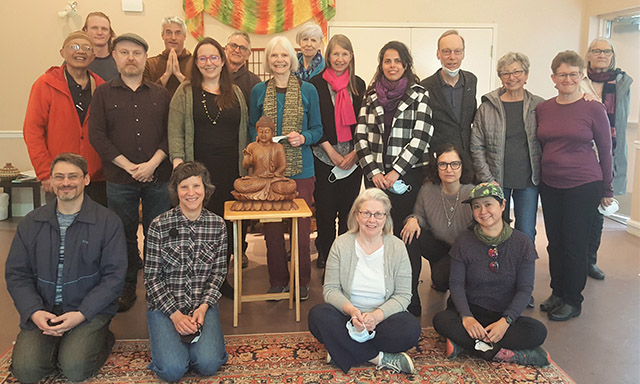
This year BCIMS community members were able to gather together to celebrate Vesak, Buddha’s birth, enlightenment, and death, for the first time since 2019.
Photos by: Jacqueline Dagenais, Rachel Lewis, Tim Rutledge
British Columbia Insight Meditation Society (BCIMS) is rapidly evolving as it emerges from the pandemic, with a new focus on diversity, new models for economic equity, and new dharma teachers.
Twenty five-year-old BCIMS has since 2020 been led by a teacher’s council comprised of co-founder Adrianne Ross, plus Rachel Lewis, James Lowe and Tempel Smith. In addition other sangha members have completed the Spirit Rock Community Dharma Leader training, and are also leading meditation groups and classes.
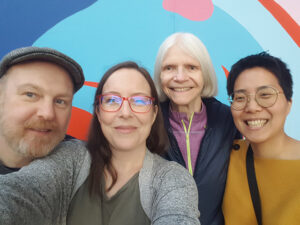
After concluding our recent nine-month program on the eightfold path, teachers Jason Leslie, Rachel Lewis, Adrianne Ross, and Mina Chung celebrated. Fifth teacher Santa Aloi was not available for this photo.
Lewis, who in 2021 completed the four-year teacher training program created by Insight Meditation Society in Massachusetts, and Spirit Rock Meditation Center in California, has helped lead the BCIMS shift toward increased mindfulness of racial issues. For instance she was part of a team updating an eight-week program for white meditators, to help them learn to use practice to understand and confront racism, in themselves and in their communities.
The sangha has also completed an audit by consulting company Empathy Catalyst, which specializes in helping organizations understand how their offerings are inaccessible for marginalized people.
In addition the sangha is rethinking its approach to dana (generosity), and how best to collect and distribute dana more equitably in a Western context. As a collective BCIMS aspires to take further steps toward dismantling structural impediments and unconscious bias in the organization, and we are reviewing how best to offer in-person and online retreats that meet the needs of the practitioners we serve.
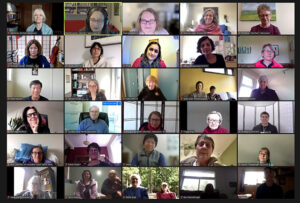
Sharon Salzberg graciously offered a talk this spring as a fundraiser for BCIMS.
For instance in the spring of 2022 we sponsored teacher Anushka Fernandopulle to teach an evening session intended for Black, Indigenous, and People of Color (BIPOC) individuals. For this event we set a sliding-scale fee, (including a free option), with the fee being applied to Anushka’s stipend.
We covered about half of our costs this way. The remainder came from the new BCIMS Diversity, Equity and Inclusion (DEI) Fund, which the sangha established fairly recently. This fall we may structure another BIPOC event similarly.
As BCIMS grows and attracts people, leaders have been paying more attention to how the organization has created barriers against including young people, BIPOC people, LGBTQI and gender-nonconforming people, and other marginalized people seeking to learn and practice dharma.
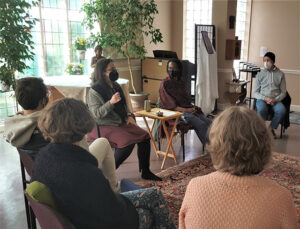
As part of the BCIMS’ emphasis on diversity, Rachel Scott and Rachel Lewis in May taught a daylong together.
In response BCIMS began offering retreats and days of practice geared to specific affinity groups, and it formed the DEI fund to remove financial barriers to participation. Also we added resources — financial, paid and volunteer — to help the organization become safer and more inclusive to all.
For a recent eightfold path program we took the opposite approach. We offered it under a pure dana model with no requested fees, with an open invitation to participants to support teachers and BCIMS as they were able.
These new models are supplementing our long-established approach of asking for a small registration fee to cover costs, and then inviting participants to contribute dana directly to the teacher.
As programming moved exclusively online with the onset of the pandemic, another avenue opened to create accessibility. With the shift to online dharma, BCIMS has been attracting a more global audience, augmenting a longstanding effort to remove physical barriers to participation.
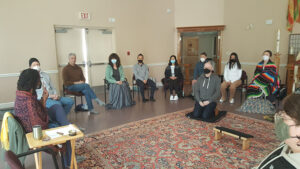
Scott connected deeply with the practitioners at the daylong.
Guiding teachers and community leaders within the organization also are evolving, and offering new types of programs. An example was the nine-month noble eightfold path study group, which included guided dharma offerings, small interactive study groups, and opportunities for strengthening daily practice.
A deep history of commitment
This dedication to Theravada tradition in British Columbia started 25 years ago, when in the late 1990s two newly authorized Vancouver teachers, Adrianne Ross and Joanne Broatch, began traveling to various communities to lead retreats and offer teachings. They were graduates of Spirit Rock’s Teacher training program, then mentored by Jack Kornfield.
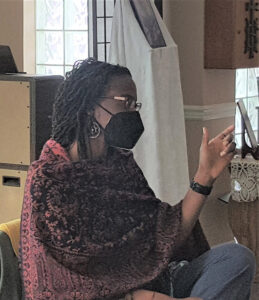
Scott makes a point.
Often Ross and Broatch would invite well-known teachers from the United States and England to teach with them, introducing British Columbians to senior dharma teachers whom they otherwise would not have met.
Ross and Broatch sowed seeds for the flourishing of the dharma throughout British Columbia. In addition to leading retreats, they trained community members to begin their own local sitting groups. Then as those groups grew organically, members felt a need to communicate and to share information with each other.
With help from volunteer sangha members, the two teachers created BCIMS with several objectives: to publish a monthly newsletter, to host a central website to share information on distributed programs, and to organize residential retreats.
Joanne Broatch sadly passed away in 2017.
BCMIS has never had a physical site of its own, so from the beginning organizers scanned the province to find suitable spaces to hold retreats. They found many spaces: a retreat center established by a Catholic Order of Sisters, an outdoor school in the Squamish Valley, a Benedictine Oblate Monastery perched high on a hilltop, an organic farm on Salt Spring Island, a Soto Zen zendo in Vancouver’s inner city, and various United, Anglican, and Unitarian churches.
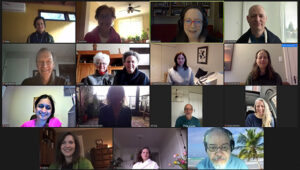
Since March, 2020, BCIMS teachers have led half-hour sits at 7 a.m. daily.
The relationships established with these centers has always been guided by a sense of interconnectedness to other faith traditions. This interconnectedness in turn has attracted practitioners of various faiths and traditions to explore mindfulness, meditation, and the dharma.
This interconnectedness is in fact a favorable outcome of BCIMS not having a permanent physical home. While lack of a permanent home has presented some challenges and opportunities, we have always sought refuge, and been sustained, by our home in the three jewels.
As consciously and wisely as we can, we continue to move forward in these endeavors. Always we’re firmly rooted in our commitment to the Buddha, guided by the dhamma, and supported by our beloved sangha.
All of this work takes place on the beautiful, traditional, and unceded lands of the Skwxwú7mesh (Squamish), xʷməθkwəy̓əm (Musqueam), and Səl̓ílwətaʔ/Selilwitulh (Tsleil-Waututh) peoples. All of them have stewarded this land for thousands of years, and so continue.
Laura Quilici (she/her) has been practicing meditation in the Theravada tradition since 2000, when she attended her first retreat, in Vancouver with Howie Cohn. She lives on Nex̱wlélex̱m (Bowen Island) on unceded Skwxwú7mesh lands. She currently serves on the board of directors at BCIMS, and is participating in Spirit Rock’s seventh Dedicated Practitioners Program.
